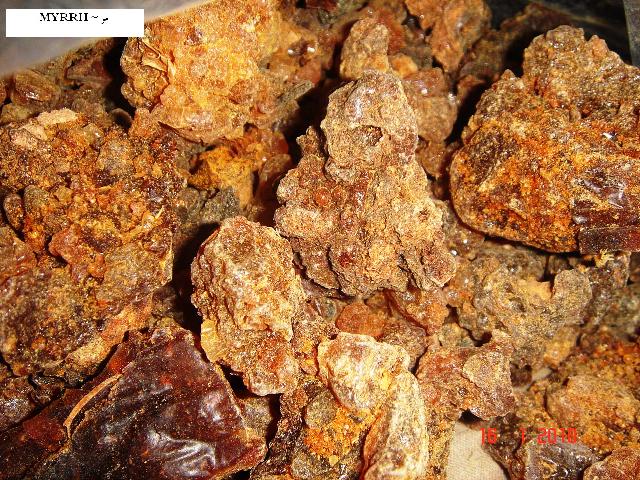اللَّهُمَّ لَكَ الحَمْدُ حَمْداً دَائِماً معَ خُلودك، ولَكَ الحَمْدُ حَمْداً لا مُنتَهى لَهُ دُونَ مَشيئَتِكَ، ولكَ الحَمدُ حَمْداً دَائِماً لا يُريدُ قَائِلُهُ إلاّ رِضَاكَ، ولَكَ الحَمْدُ حَمْداً عِندَ كُلِّ طَرْفَةِ عَيْنٍ وتنفُّسِ كُلِّ نَفْس
Myrrh ~ مر مكي
روى أبو نعيم في الطب عن أبان بن صالح عن أنس - رضي الله تعالى عنه - أن رسول الله - صلى الله عليه وسلم - قال: (بخروا بيوتكم بالشيح والمر والصعتر) (حديث ضعيف) كنز العمال 28316
Narrated by Abu Nuaim on the authority of Abban Bin Saleh Bin Anas radi Allaho Anh, that Prophet Muhammad Sallallaho Alaihe Wasallam said : "Fumigate your houses with Mugwort, Myrrh & Thyme". (Kanz-ul-Ummal) (Weak Hadith)
Apart from fumigation, all of the above 3 are edible as well & the combined army of these three will kill the germs, bacteria & other microbes / organisms in intestines Insha'Allah. Myrrh is one of the resins praised by Tibb-e-Nabwi, & it is mostly used for fumigation, the fragrance of Myrrh will refresh every corner of your house. Another species of Myrrh is Guggulu (Commiphora mukul) which has similar properties, but Myrrh is more stronger.
When used internally, Myrrh is a powerful de-toxifier, lowers cholesterol & it stabilizes blood sugar levels. The sweet-smelling oleo-gum resin is alterative, analgesic, antibiotic, antiinflammatory, antimicrobial, antiseptic, antispasmodic, antiviral, astringent, bitter, carminative, diaphoretic, disinfectant, emetic (large doses) emmenagogue, expectorant, purgative (large doses), rejuvenative, sedative, stimulant, stomachic and tonic. In Unani medicines it is used in dysmenorrhoea and amenorrhoea, in chest infections and chronic bronchitis, asthma and phthisis for stimulating expectoration. It is also useful in dyspepsia and uterine infections. Powdered myrrh has been endorsed as a beneficial treatment for inflammations in the throat and mouth. Myrrh acts as a broad-spectrum antiseptic and can be applied directly to sores and wounds. Taken internally, myrrh is a beneficial treatment for loose teeth, gingivitis, and bad breath. The tincture may also be applied directly to a tooth to relieve toothache. It is antifungal, and has been used to treat athlete’s foot and Candida. Some research indicates that myrrh is effective in reducing cholesterol levels. It is a tonic remedy said to relax smooth muscles, increase peristaltic action, and stimulate gastric secretions. The myrrh resin has antimicrobial properties and acts to stimulate macrophage activity in the blood stream. The herb is being studied for its potential as an anticancer medication. It is useful for relieving gastric distress and as an expectorant. Myrrh increases the motility of white blood cells and normalizes mucous membrane activity, which helps the body fight infection. It also promotes tissue granulation and combats blood stagnation.

